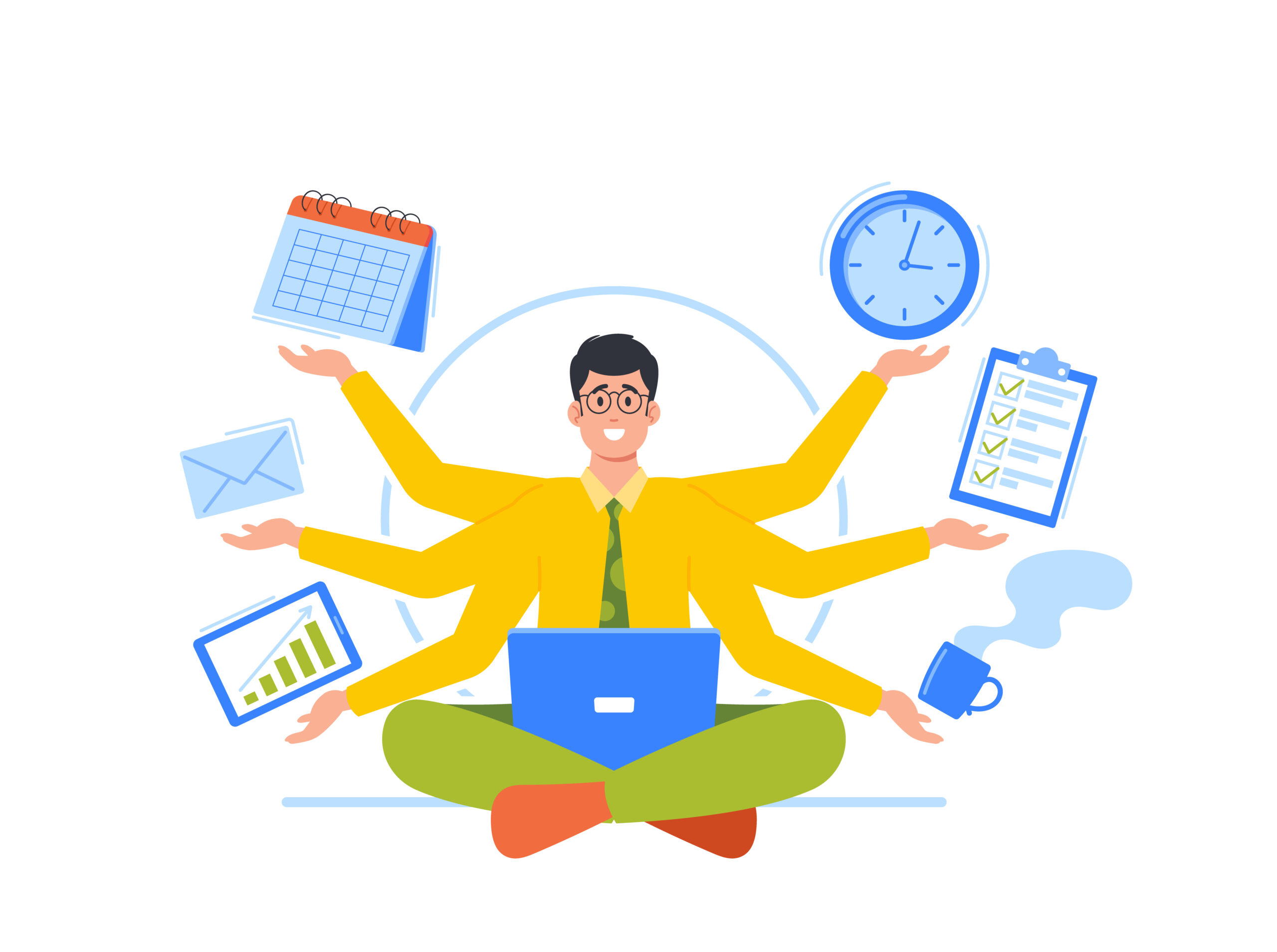Maintaining a healthy work-life balance is crucial to ensure overall well-being and productivity. A healthy work-life balance means allocating appropriate time to work, personal life, and self-care activities. When people prioritize their personal life and health along with work, it helps to reduce stress, avoid burnout, and increase productivity. However, achieving a healthy work-life balance can be challenging, especially during the new year, when people make resolutions and set new goals. The holiday season stress can also impact work-life balance, making it harder to maintain a routine. Setting boundaries is another challenge people face, as it can be difficult to say no to work-related tasks. In this scenario, it is essential to plan and prioritize tasks, set boundaries, and communicate effectively with colleagues and managers. To help navigate these challenges and create a fulfilling new year with a balanced work-life, we have created this blog as a guide. It provides tips and strategies to maintain a healthy work-life balance, set achievable goals, manage stress, and create boundaries. With this guide, you can create a balanced work-life, achieve your goals, and improve your well-being.

Prioritizing Yourself:
Physical health:
Maintaining physical health is crucial for a balanced and productive work life. Adequate sleep, typically 7-9 hours per night, is essential for cognitive function, mood regulation, and overall well-being. To establish a healthy sleep routine, consider setting a consistent bedtime and wake-up time, creating a calming pre-sleep routine, and minimizing screen time before bed. Sleep-tracking apps like Sleep Cycle or Relax Melodies can help monitor and improve sleep patterns. Regular exercise is vital for physical health and can enhance mental well-being. Incorporate short bursts of activity throughout the workday, such as taking short walks or doing desk exercises. For more structured workouts, find a routine that suits your schedule, whether it’s morning workouts before work or lunchtime exercises. Fitness apps like Nike Training Club or MyFitnessPal offer diverse workout plans that cater to different fitness levels and time constraints.
Mental well-being:
To maintain mental well-being in the workplace, stress management is paramount. Implementing mindfulness techniques and meditation can significantly reduce stress levels. Apps like Headspace or Calm offer guided meditation sessions, making it easier to integrate into your daily routine. Take short breaks during the workday to practice deep breathing or simple stretching exercises to alleviate tension. Journaling is an effective way to process thoughts and emotions, providing clarity and reducing stress. Dedicate a few minutes each day to jot down your feelings, accomplishments, and goals. This practice can foster self-awareness and contribute to a more positive mindset. Additionally, prioritize leisure activities and hobbies that bring joy and relaxation. Whether it’s reading, gardening, or playing a musical instrument, engaging in activities outside of work helps maintain a healthy work-life balance. Set boundaries to avoid overworking and allocate time for self-care to recharge and foster a positive mental state.
Setting Healthy Boundaries:
Work hours and communication:
Creating a well-balanced work-life routine requires establishing clear and defined work hours. It is crucial to communicate these hours transparently to both colleagues and employers, setting clear expectations for when you are available for work-related tasks. Additionally, effective communication practices include setting boundaries with emails and notifications. You should assign specific times for checking and responding to emails, use filters to prioritize messages and utilize “Do Not Disturb” modes to reduce interruptions during focused work periods. Integrating these practices with tools like work calendars enhances organization and collaboration. By fostering a culture that values and respects these boundaries, individuals can contribute to their well-being and the overall productivity and harmony of the workplace.
Saying “no” and delegating:
In the fast-paced world of work, learning how to say “no” and delegate tasks can be incredibly helpful for your well-being and productivity. Saying “no” doesn’t mean you’re not good at your job, it’s a smart way to avoid getting overwhelmed and to make sure you can deliver quality work. Delegating tasks is all about knowing what you’re good at and trusting your colleagues to help out with things you’re not as good at. It’s important to prioritize what needs to get done and to be honest about how much you can handle. If you’re feeling overloaded, it’s important to speak up and ask for help. This can help create a more supportive work environment where everyone feels comfortable discussing their workload. If you need to have a difficult conversation about workload, try to use positive language, suggest solutions, and focus on what you’re trying to achieve as a team. Finally, it’s important to set realistic expectations for yourself and others and to make sure you’re not taking on too much work. By following these principles, you can be more effective at work and help create a more positive workplace culture.
Creating a Balanced Schedule:
Planning and time management:
Being able to plan effectively and manage your time well is important for achieving success in all aspects of life. Tools like calendars, planners, and to-do lists can help you stay organized and on top of your tasks and deadlines. It’s also important to prioritize your tasks based on what’s most urgent and important so that you can get the most important things done first. Taking regular breaks is crucial to stay focused and avoid burning out. And if you find yourself procrastinating, try breaking tasks down into smaller, more manageable steps. Remember to be flexible, because unexpected things can happen. Being able to adapt to change with a positive attitude and adjust your plans accordingly will help you stay productive and resilient in the long run.
Making time for personal priorities:
Living a fulfilling life is not just about succeeding in your job. It’s also important to create a balance that includes things that are important to you, such as hobbies, spending time with loved ones, and socializing. To take care of yourself and your mental health, it’s important to set aside time just for yourself. Maintaining healthy relationships also requires effort, so it’s important to make time to spend with those you care about. Taking vacations and breaks from work is also important because it helps you recharge and come back to work more energized and productive. By finding a balance between work and personal priorities, you can lead a more satisfying and fulfilling life.
Maintaining Balance Throughout the Year:

Achieving a healthy balance between work and personal life is an ongoing process that requires constant communication and adjustments. It’s important to create a work environment where you can openly talk about your concerns related to work-life balance with your employers and colleagues. To maintain a healthy balance, you need to advocate for yourself and set clear expectations about your workload and boundaries.
Remember that work-life balance is not a fixed thing, and you need to regularly assess your priorities and make necessary changes. Reflecting on your own needs and goals can help you track your progress, celebrate your achievements, and identify areas where you need to improve.
Conclusion:
In life, it’s important to balance our work commitments with our personal needs. It’s not just about having a goal, but consistently working towards it to maintain our physical and mental health and productivity. Based on our discussion, we can say that effective communication, time management, and self-care are key to achieving this balance. As you think about these ideas, try to take small steps towards a healthy work-life balance. For example, set clear work hours, use tools to manage your time efficiently, and make sure you take care of your well-being. Remember, it’s a journey and not a destination, so keep making adjustments along the way. Finally, it’s okay to communicate your needs to your boss or colleagues. Being open about your challenges can create a supportive environment.






